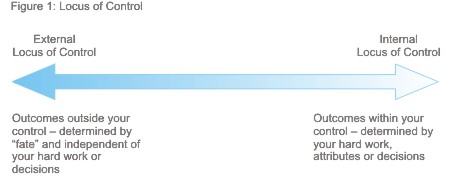Originally posted on CFAR's blog.
What's one thing you can do to improve your physical and mental health, be happier and more successful?
Before I tell you the answer, first try answering these questions (interpretation in the footnotes [1]). For each question select the statement (a or b) that you agree with the most.
a) Many of the unhappy things in people’s lives are partly due to bad luck. b) People’s misfortunes result from the mistakes they make.
a) In the long run, people get the respect they deserve in this world. b) Unfortunately, an individual’s worth often passes unrecognized no matter how hard he tries.
a) Most people don’t realize the extent to which their lives are controlled by accidental happenings. b) There really is no such thing as luck.
What on earth is a locus of control?
A locust on earth
Julian Rotter, one of the most influential academic psychologists of the 20th century [2], suggested that people tend to fall somewhere on the scale between having what he called an internal locus (‘internals’) and having an external locus (‘externals’). People who see outcomes, both good and bad, to be due to their own doing are said to have a strong internal locus (the left side of the below scale). Conversely, those who see outcomes as mainly owing to fate, uncontrollable circumstances, or that the world is too unpredictable and complex to successfully influence are said to be externals. This theory predicts that people who internalize the successes and failures of life are likely to be more confident and active in pursuing their goals than externals.
Rotter's locus of control scale
Why does all this matter?
Ng, Sorensen and Eby [3] review the literature on the topic and stumble on some interesting findings in your health, professional, and personal life. People with a strong internal locus of control scored 33% higher on job satisfaction, performance, position and attendance than those with an external locus of control. Internals are more intrinsically motivated, have lower stress rates and overall burnout rates (despite working longer hours). In the studies conducted, if a participant thought they could alter or control outcomes in their life, they even showed improvements in physical and mental well-being.
A word of caution, though, that this might just be correlation, not causation - it could easily be the case that people who feel in control of their lives do so because they’ve been successful.
What do we do about this?
Rotter suggests altering our thoughts to be internal (“I did it”) but not thinking globally (“it always happens”) or in stable terms (“it will always happen”)[3]. For example, imagine receiving a failing grade for your maths test. An adaptive response, again according to Rotter, would be to say "I failed on this maths test. It’s my fault, but it’s because I didn’t study hard this time and haven’t put enough effort into it." Less adaptive ways to respond might be “I failed, I always fail, and I fail at everything” or "the stupid test was too hard and the teacher doesn't like me". Health is another useful application of this technique and it might help to say “I’m not fit because I haven’t been exercising, but I have been fit before, and it doesn’t have to be this way forever”. Are there any areas you can apply these techniques to?
If you’re confident in the conclusions of this research, you might want to try shifting your locus of control to be more internal. (Attending a CFAR workshop is one intervention you might try! Although you can also invent your own.) Of course, there are a few things that are out of your control - but probably fewer than you think.
Edit: See Greg's excellent response, which I mostly agree with.
Footnotes
[1] 1.a) 2. b) 3. a)→ high external locus of control 1.b) 2. a) 3. b)→ high internal locus of control You can take the full test here⤴
[2] Haggbloom SJ, Warnick R, Warnick JE, Jones VK, Yarbrough GL, Russell TM, et al. The 100 most eminent psychologists of the 20th century. Review of General Psychology. 2002;6(2):139. doi: 10.1037/1089-2680.6.2.139⤴
[3] Ng, TW, Sorensen, KL, & Eby, LT. (2006). Locus of control at work: a meta‐analysis. Journal of organizational Behavior, 27(8), 1057-1087. http://onlinelibrary.wiley.com/doi/10.1002/job.416/pdf⤴
[4] http://ubc-emotionlab.ca/wp-content/uploads/2013/08/Lecture-20-Cognition-wrap-up-Begin-Emotions.pdf
[5] Thanks to Jess Whittlestone, Lyra Rinaudo and Anna Salamon for reviewing drafts of this post and suggestions.


